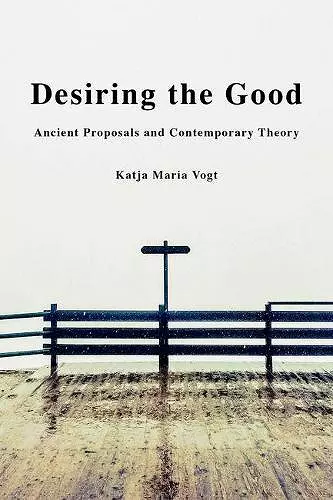Desiring the Good
Ancient Proposals and Contemporary Theory
Format:Hardback
Publisher:Oxford University Press Inc
Published:14th Sep '17
Currently unavailable, and unfortunately no date known when it will be back
This hardback is available in another edition too:
- Paperback£27.49(9780197581209)

Desiring the Good defends a novel and distinctive approach in ethics that is inspired by ancient philosophy. Ethics, according to this approach, starts from one question and its most immediate answer: "what is the good for human beings?"--"a well-going human life." Ethics thus conceived is broader than moral philosophy. It includes a range of topics in psychology and metaphysics. Plato's Philebus is the ancestor of this approach. Its first premise, defended in Book I of Aristotle's Nicomachean Ethics, is that the final agential good is the good human life. Though Aristotle introduces this premise while analyzing human activities, it is absent from approaches in the theory of action that self-identify as Aristotelian. This absence, Vogt argues, is a deep and far-reaching mistake, one that can be traced back to Elizabeth Anscombe's influential proposals. And yet, the book is Anscombian in spirit. It engages with ancient texts in order to contribute to philosophy today, and it takes questions about the human mind to be prior to, and relevant to, substantive normative matters. In this spirit, Desiring the Good puts forward a new version of the Guise of the Good, namely that desire to have one's life go well shapes and sustains mid- and small-scale motivations. A theory of good human lives, it is argued, must make room for a plurality of good lives. Along these lines, the book lays out a non-relativist version of Protagoras's Measure Doctrine and defends a new kind of realism about good human lives.
...her engagement with ancient ideas is creative and novel. Vogt's monograph is therefore an important contribution to scholarship in ancient philosophy. Furthermore, she enriches the contemporary ethical debate, since she offers an interesting and novel way to discuss the question of the good with regard to human agency, psychology and the metaphysics of human action. * Laura Summa, ZEMO *
Katja Maria Vogt proposes a refreshing, comprehensive, and intuitive Aristotle-cum-Plato inspired approach to ethics ... Her book is demanding yet rewarding ... Vogt's work lays a foundation that allows moral realists to be able to claim that there is a good for human beings and a good for individuals. This work is a welcome addition to Aristotelian ethics. * David J. Rodriguez, Journal of Moral Philosophy *
Vogt's book promises an exciting result: ancient ethics can not only influence but can be extended into contemporary thought. Vogt offers, inequal part, an exegetical account of ancient theories, and how they can be developed in such a way that they are brought into directconversation with the state-of-the-art in contemporary metaethics. [] I would recommend Vogt's book to anyone interested in ancientphilosophy and its contemporary applications. The book should also appeal to (historically-minded) philosophers working on action theory,ethics, and metaethics. Apart from providing a number of very interesting analyses of ancient texts, this book develops a systematic theory ofmotivation and the good which is worthwhile pursuing. The book is well produced with appealing photography on the dustjacket. * Udit Bery, Ancient Philosophy Today *
Vogt brings Aristotle's Nicomachean Ethics and Plato's Philebus, Euthyphro and Symposium into dialogue with contemporary authors such as Elizabeth Anscombe, J. David Velleman, Bernard Williams, George Edward Moore, Samuel Scheffler and Paul Boghossian. [...] Vogt's book is on the cutting edge of moral philosophy, metaphysics, theory of action and psychology. Theories that regard humans as 'angelic', as purely thinking beings, and that are averse to psychological and metaphysical contingencies, according to Vogt are necessarily defective. For this reason, she considers the good that agents are most familiar with, namely the good human life as they conceive of it, as a suitable starting point for ethical inquiry. * Seppe Segers, Tijdschrift voor Filosofie *
Vogt's book is an important and very welcome contribution for all those who are interested in developing an Aristotelian approach in the context of contemporary ethics. She puts into focus certain deficits of the contemporary discussion and provides a compelling example for how engagement with ancient texts can benefit the contemporary debate. * Jan Szaif, Notre Dame Philosophical Reviews *
ISBN: 9780190692476
Dimensions: 142mm x 211mm x 25mm
Weight: 363g
232 pages